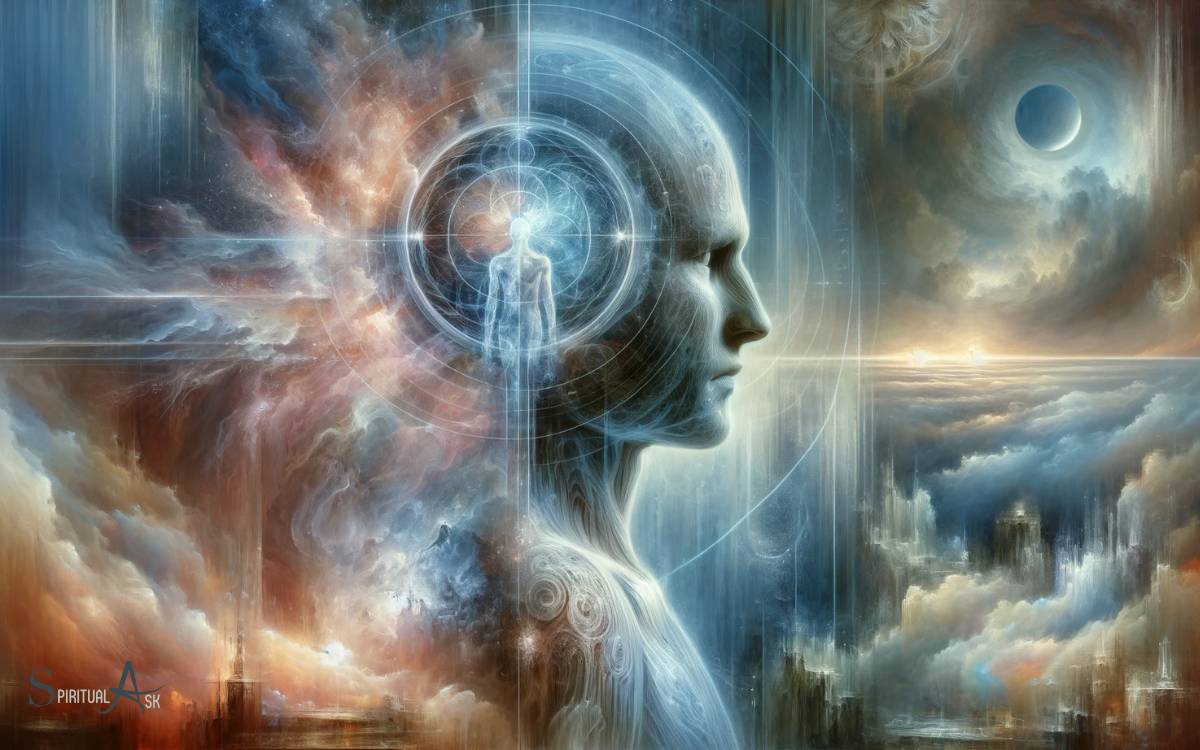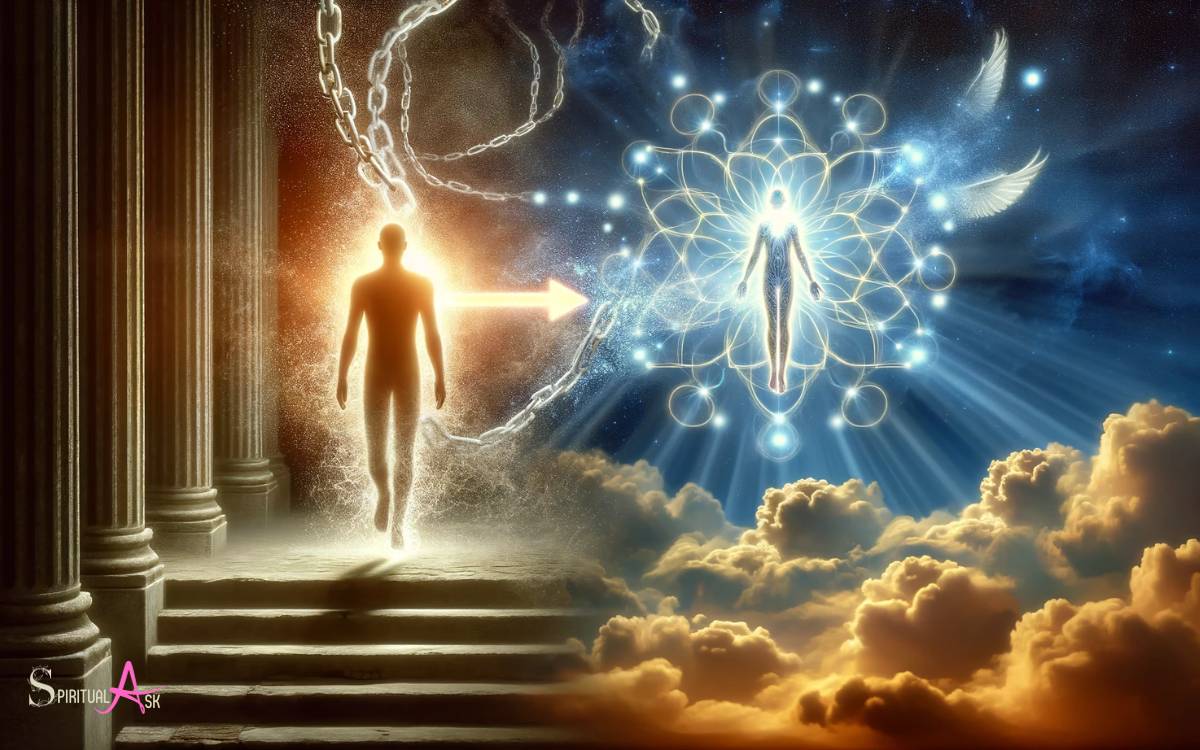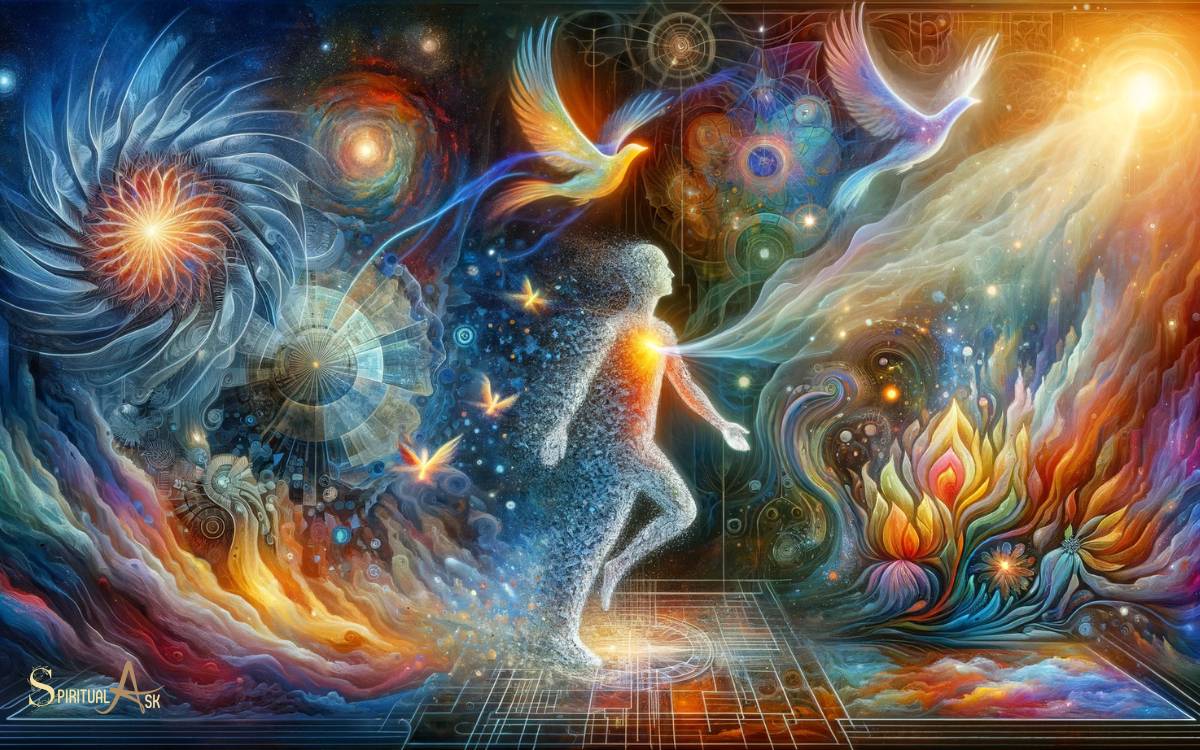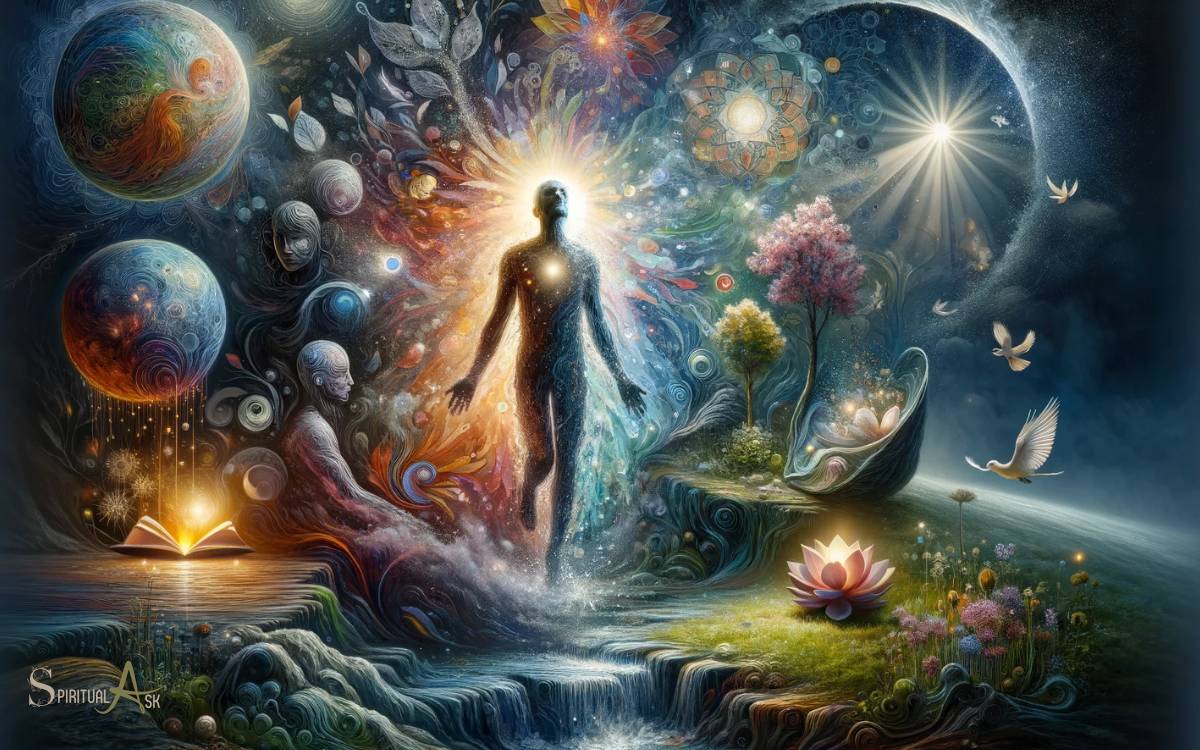Dissociation And Spiritual Awakening: Sense of Identity!
Dissociation and spiritual awakening are two distinct processes that can occur in one’s life. Dissociation is a psychological experience where a person disconnects from their thoughts, feelings, memories, or sense of identity.
On the other hand, a spiritual awakening is a process of broadening one’s consciousness and deepening one’s understanding of life’s interconnectedness.
Dissociation is often a response to traumatic experiences, leading individuals to disconnect from reality as a coping mechanism. It can be characterized by feelings of being detached or disoriented and can lead to conditions like dissociative identity disorder.
Alternatively, a spiritual awakening is a voluntary and often joyful experience that leads to significant personal growth and transformation.
It involves a shift in perception where one begins to see the world and themselves from a more profound and interconnected perspective.
While dissociation and spiritual awakening may seem similar as they both involve shifts in perception and consciousness, they are fundamentally different.
The former is often a reaction to trauma and can lead to psychological disorders, while the latter is a holistic process leading to personal growth and a heightened sense of interconnectedness with the world.

Key Takeaway
8 Characteristics: Dissociation And Spiritual Awakening
| Dissociation Characteristics | Spiritual Awakening Characteristics |
|---|---|
| Feeling detached from reality | Increased consciousness |
| Problems with memory or identity | Enhanced sense of purpose |
| Lack of a sense of self-identity | Deepened connection to self and others |
| Feeling emotionally numb | Heightened emotional sensitivity |
| Experiencing a sense of unreality | Enhanced perception of reality |
| Depersonalization or derealization | Spiritual enlightenment |
| Disconnection from mind, body, or surroundings | Greater mind-body-spirit connection |
| May occur due to trauma or stress | Often occurs following significant life changes |
Five Facts About: Dissociation And Spiritual Awakening
What Is Dissociation And How Does It Manifest?

Overview Of Dissociation
Dissociation refers to a coping mechanism that the brain initiates when dealing with overwhelming stress or anxiety, leading to disconnection from reality.
It can manifest in various forms, such as problems with memory, emotions, and identity.
Types Of Dissociative States
There are three types of dissociative states, including depersonalization, derealization, and dissociative amnesia.
- Depersonalization: A person feels disconnected from themselves, as if they are watching themselves from the outside.
- Derealization: The individual feels disconnected from the environment, having a sense that they are living in a dream-like world.
- Dissociative amnesia: Memory loss or lack of autobiographical memory due to dissociation.
Symptoms Of Dissociation

Dissociation manifests in various symptoms that can affect both the body and mind.
The symptoms may vary from person to person, but here are a few common ones:
- Feeling like you are in a trance or a daydream
- Memory loss or difficulty remembering things
- Feeling detached from oneself or the environment
- Feeling overwhelmed or emotionally numb
- Inability to control one’s emotions
- Feeling dissociated from one’s senses, such as losing sense of touch or sight.
Dissociation is a coping mechanism that people use to deal with extreme stress or trauma, leading to disconnection from reality. Depersonalization, derealization, and dissociative amnesia are the types of dissociative states that people experience.
Dissociation can cause various symptoms such as memory loss, detachment from oneself and surroundings, emotional numbness, and inability to control emotions.
What Is Spiritual Awakening And How Does It Manifest?
Dissociation can be described as a phenomenon in which an individual feels detached from their surroundings or themselves.
Spiritual awakening, on the other hand, is defined as an experience of self-discovery that leads to a profound understanding of oneself and the universe.

It may occur spontaneously or as a result of specific spiritual practices such as meditation. In this section, we will delve into what spiritual awakening is and some of its characteristics.
Definition Of Spiritual Awakening
Spiritual awakening is a process of discovering one’s true self and the interconnectivity of all things in the universe. It is a transformative experience that brings about a sense of higher consciousness and understanding of one’s purpose in life.
Some common signs of spiritual awakening include:
Common Traits Of Spiritual Awakening
- A shift in one’s perspective on life
- A sense of detachment from material possessions and ego
- Increased compassion and empathy towards others
- A feeling of oneness with the universe
- A deepened sense of intuition and spiritual connection
Benefits And Challenges Of Spiritual Awakening

While spiritual awakening can be a rewarding experience, it can also present some challenges. One of the challenges is the feeling of alienation from society which may cause issues when attempting to reintegrate into daily life.
However, the benefits of spiritual awakening far outweigh the negatives, some of which include:
- A sense of inner peace and contentment
- Increased awareness of one’s thoughts and emotions
- Improved relationships with others
- A greater sense of purpose and direction in life
Spiritual awakening is a transformative experience that can bring about positive change in an individual’s life.
Despite the challenges that may arise, the benefits offer a strong incentive for individuals to explore their spirituality and embark on a journey of self-discovery.
The Link Between Dissociation And Spiritual Awakening

Dissociation And Spiritual Awakening
Dissociation and spiritual awakening – two profoundly complex topics often spoken of together. Many individuals report experiencing a dissociative episode before or during a spiritual awakening.
This piece will delve into the relationship between these two events, exploring the connection and why one may trigger the other.
How Dissociation May Be Related To Spiritual Awakening
Dissociation and spiritual awakening may seem like two separate entities, but they may share a significant link.
Here are some key points to consider:
- Dissociation causes a split between an individual’s mind and body. In a dissociative episode, an individual might feel like they are watching themselves from a distance, leading to a sense of detachment from their surroundings.
- This detachment can act as a catalyst for spiritual awakening, prompting individuals to question their reality and seek answers that extend beyond the physical world.
- Dissociation allows individuals to access deeper levels of consciousness, which can lead to spiritual visions or a sense of union with a higher power.
Why Dissociation May Trigger Spiritual Awakening

There are many reasons why dissociation may trigger spiritual awakening.
The following points offer further explanation:
- Dissociation can create an opportunity for individuals to explore their beliefs and question their identity. This self-reflection can lead to a spiritual awakening as the individual begins to search for meaning and purpose.
- Dissociation can leave individuals feeling lost and disconnected from their surroundings. This sense of emptiness can propel individuals to seek something greater than themselves, such as a higher power or spiritual connection.
- Dissociation can open up pathways to the unconscious mind, unlocking dormant emotions and memories. This release can lead to a spiritual awakening by allowing individuals to release past traumas and access a deeper sense of self.
Overall, there is a complex and intricate link between dissociation and spiritual awakening. Dissociation can act as a crucial stepping stone on the path to spiritual enlightenment.
By exploring the relationship between these two events, we can gain a deeper understanding of the process of inner growth and development.
Embracing Spiritual Awakening During Dissociative States

Dissociation is a mental state characterized by a feeling of disconnection from oneself, surroundings, and reality. It is often a coping mechanism in response to trauma, but it can also be a spiritual awakening experience.
Ways To Practice Spiritual Growth While Dissociating
Even though dissociation can be an uncomfortable experience, it can also be an opportunity for spiritual growth.
Here are some ways to practice spiritual growth while dissociating:
- Mindfulness meditation: Focus on the present moment and observe your thoughts and emotions without judgment.
- Grounding techniques: Use your senses to connect with the present moment by touching, smelling, seeing, and hearing your surroundings.
- Breathwork: Practice breathing exercises to regulate your emotions and re-center yourself.
- Creative expression: Use art, music, or writing to express your emotions and connect with your inner self.
How Spiritual Insights Can Help Heal Trauma-Induced Dissociation

Trauma-induced dissociation can be a longstanding issue that affects every aspect of life.
However, spiritual insights can help heal trauma-induced dissociation by:
- Providing a sense of meaning and purpose: Dissociative individuals can feel detached from a sense of meaning or purpose in life, but spiritual insights can provide a renewed sense of direction.
- Offering a sense of connection: Dissociation can cause an individual to feel disconnected from their surroundings and other people. Spiritual insights can help connect individuals with their inner selves, higher power or transcendent aspects of existence.
- Providing a sense of transcendence: Dissociation can make an individual feel trapped in their trauma. However, spiritual insights can provide a sense of transcendence beyond the experiences of the past.
Dissociation can be a unique opportunity for spiritual growth.
By embracing spiritual insights during dissociative states, individuals can heal trauma-induced dissociation and gain a sense of meaning, connection, and transcendence.
Can Hair Changes Indicate a Shift in Identity During Spiritual Awakening?
Hair and Spiritual Awakening changes in one’s hair, whether through a new style, color, or even the decision to let it grow or cut it short, can indeed reflect a shift in identity during a spiritual awakening.
This transformation is not just about altering appearance but can signify deeper changes within:
- Expression of Inner Change: As individuals evolve spiritually, they may feel compelled to express their internal transformation in various external ways, including changing their hair.
- Symbol of Renewal: In many cultures, hair is seen as a symbol of strength and personal power. Changing one’s hair can be a symbolic act of shedding the old and embracing the new self.
- Asserting Control: During times of significant change, altering one’s hairstyle can be a way to assert control and make a tangible decision about one’s identity and presentation to the world.
While the physical act of changing hair might seem superficial, it can be a meaningful part of the journey during a spiritual awakening, symbolizing the deeper shifts occurring within an individual’s identity and perception.
FAQ About Dissociation And Spiritual Awakening
What Is Dissociation?
Dissociation is a state of disconnection from reality or oneself, often caused by trauma or stress.
What Are The Symptoms Of Dissociation?
Common symptoms of dissociation include feeling disconnected from one’s body, memory lapses or gaps, and a sense of detachment from surroundings or emotions.
Can Dissociation Be Helpful?
Although dissociation is often associated with negative experiences, it can also be a helpful coping mechanism for those dealing with overwhelming emotions or trauma.
What Is Spiritual Awakening?
Spiritual awakening refers to a state of increased awareness and connection with one’s inner self, others, and the universe.
Conclusion
The journey of dissociation and spiritual awakening can be challenging, yet rewarding in many ways. For those experiencing dissociation, there may be a sense of being lost or disconnected from reality.
However, with the right methods and support, it is possible to understand and work through these experiences.
Spiritual awakening can also involve a sense of disconnection from the physical world, but with a greater sense of connectedness and purpose in the spiritual realm. This awakening often brings a shift in priorities, as material concerns take a backseat to the pursuit of inner peace and universal understanding. It encourages individuals to embrace the spiritual practice of inclusivity, fostering compassion and a deeper connection with all living beings. Through this lens, life is seen as a tapestry where every interaction and experience holds profound meaning and potential for growth.
The relationship between these experiences is complex and unique to each individual. It is important to approach dissociation and spiritual awakening with an open mind and seek out guidance when needed.
By doing so, one can cultivate a deeper understanding of oneself and the world around them, leading to a more fulfilled and meaningful life.






